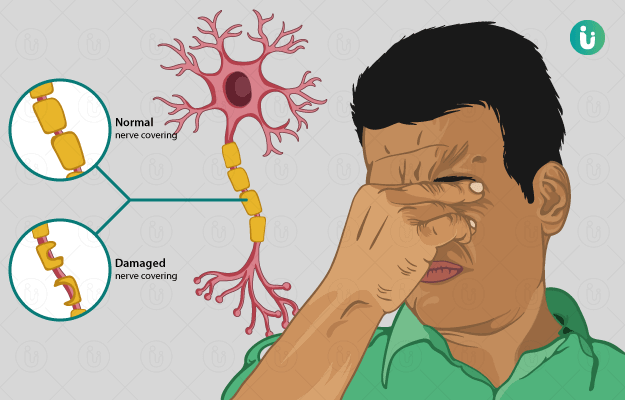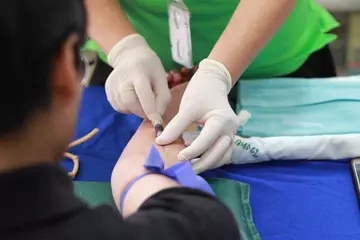What is Multiple Sclerosis (MS)?
MS is a long-lasting disease that affects the brain, spinal cord, and the nerves of the eyes. Since the disease is caused by the body's immune system attacking its own tissues, MS is said to be an autoimmune disease. In this condition, the body causes damage to the myelin — a fatty substance that surrounds the nerve fibres in the brain and spinal cord. This damage further results into altered or stopped message transfer within the nervous system.
What are its main signs and symptoms?
Symptoms are classified as primary, secondary and tertiary as below:
Primary symptoms
Common
- Numbness and tingling
- Itching
- Burning
- Difficulty walking (due to fatigue, weakness, spasticity, loss of balance or tremors)
- Vision problems
- Constipation and bladder dysfunction
- Dizziness
- Sexual problems
Rare symptoms
- Difficulty swallowing
- Speech disturbances
- Difficulty breathing
- Hearing loss
- Seizures
- Headache
Secondary symptoms
- Urinary tract infections
- Inactivity of the body
- Loss of movements
Tertiary symptoms
- Social anxiety
- Vocational complications
- Learning difficulties
- Depression
What are its main causes?
The cause of MS is unknown. However, environmental and genetic factors appear to be responsible for this disease.
Risk factors contributing to MS are as follows:
- Individuals between the ages 15 and 60 are typically affected. In India, this age is slightly higher- 33 ± 9 years- as reported by AIIMS resgistry
- More women than men are seen to have MS
- Family history of MS
- Viruses such as the Epstein-Barr virus have been linked to MS
- Those with thyroid disease, diabetes or inflammatory bowel disease seem to be more affected
- Low vitamin D levels in the blood
- Living farther from the equator
- Obesity
- Smoking
How is it diagnosed and treated?
Since the symptoms of MS can mimic those of many other nerve disorders, it is difficult to diagnose the disease.
The doctor would ask for your medical history and look for signs of nerve damage in your brain, spinal cord, and optic nerves.
Following tests can help diagnose MS:
- Blood tests to rule out diseases that have similar symptoms.
- Assessment of balance, coordination, vision, and other functions to determine nerve function.
- Magnetic resonance imaging (MRI) to visualise the structure of the body.
- Cerebrospinal fluid to identify any abnormalities in proteins.
- Tests that measure the electrical activity in your brain.
There is no cure for MS, but a number of treatments can help improve body functions. Due to the easier availability of treatment and diagnostic methods, many more cases of multiple sclerosis are now being diagnosed in India than ever before. Though, there is still a need to improve healthcare facilities in rural and remote areas so nationwide data can be obtained about the prevalence of this disease.
Common treatment methods used for MS include:
- Medications are prescribed to slow the course of the disease, prevent or treat attacks, and ease symptoms. Steroids help make MS attacks shorter and less severe. Muscle relaxants or tranquilisers can ease muscle spasms.
- Physiotherapy may help to keep up the strength and balance and help manage fatigue and pain.
- A cane, walker or braces can help you walk more easily.
- Exercise and yoga to ease fatigue or stress.
- Recently, a drug named ocrelizumab was approved by the food and drug administration (FDA) for the treatment of multiple sclerosis. It is a monoclonal antibody that has been found to be effective in the management of both relapsing and primary progressing type of multiple sclerosis. Though it is associated with the risk of infection and allergies- which could be life-threatening and need immediate medical attention. You can talk to your doctor to know more about this drug and its safety concerns.

 Doctors for Multiple Sclerosis
Doctors for Multiple Sclerosis  OTC Medicines for Multiple Sclerosis
OTC Medicines for Multiple Sclerosis
 Multiple Sclerosis articles
Multiple Sclerosis articles

 Diet for Multiple Sclerosis
Diet for Multiple Sclerosis







 Dt. Akanksha Mishra
Dt. Akanksha Mishra











